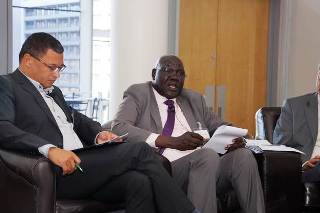S. Sudan at risk of water and environmental pollution: official
April 22, 2013 (JUBA) – South Sudan, which suffered decades of civil war with neighboring Sudan, faces high risks of environmental and water pollution, an official told a summit in South Africa.

Several speakers from different countries, attended th two-day summit, organized by the Mayor of Cape Town, Patricia de Lille at Cape Town International Convention Center, South Africa.
He however stressed that pollution remains a major problem in the continent, given Africa’s fast growing urbanization.
“(..)Concentration of population, particularly in large cities is posing unprecedented pressure on the urban infrastructure and its basic, recreational and other social facilities,” Kulang told the summit.
The SSIA chairman, further said, while most urban centers usually face problems, such as inadequate water, electricity, sanitation, transportation and transportation, they is need for proper urban planning.
“Social class division becomes apparent where the disadvantage groups are always pushed to the edges of the cities creating shanty towns. Unemployment particularly among the youth becomes a social challenge that amounts into increase in crime rates,” he remarked.
As a result, provision of urban infrastructure service and envelopment constitute a real challenge today that deserves a focus on how this situation can be addressed and improved, he added, advocating for effective development policies and strategies.
According to Kulang, Juba, the new nation’s capital, still faces enormous challenges, citing the absence of approaches, strategies and infrastructure tools for urban planning; inefficient land use policies and land management regulations; inadequate solid and liquid waste management as well as inadequate urban transportation facilities, traffic concessions, lack of transport terminals and stations.
He however said to ensure sustainable urban infrastructure service delivery to the problems facing Juba, the following needed to be put in place;
- Not to take only courage but commitment and reasonability to empirical planning and budgeting for better and sustainable urban infrastructure for all urban dwellers
- Consolidate a renewed political will for effective implementation of the desired policies and rules of thump as effective delivery of urban development services
- Sensitization of stake holders about their roles, responsibilities and obligations
- Creating enabling environment of both domestic and foreign investment in the urban development sectors
- Develop robust management of urban infrastructure to ensure cost effective recovery and as well to ensure comprehensive approaches to tackle major concerns, e.g. land, shelter, traffic gams and other social infrastructure service
- To ensure that urban development should be investment driven rather than a political vehicle.
(ST)
